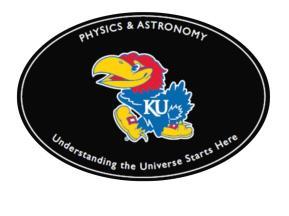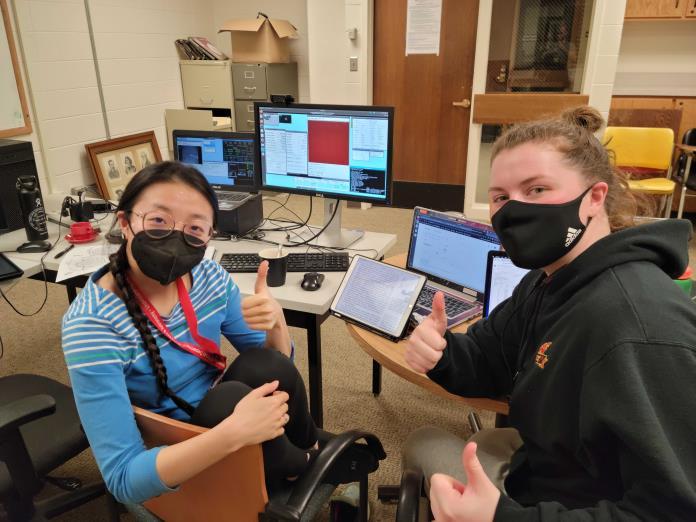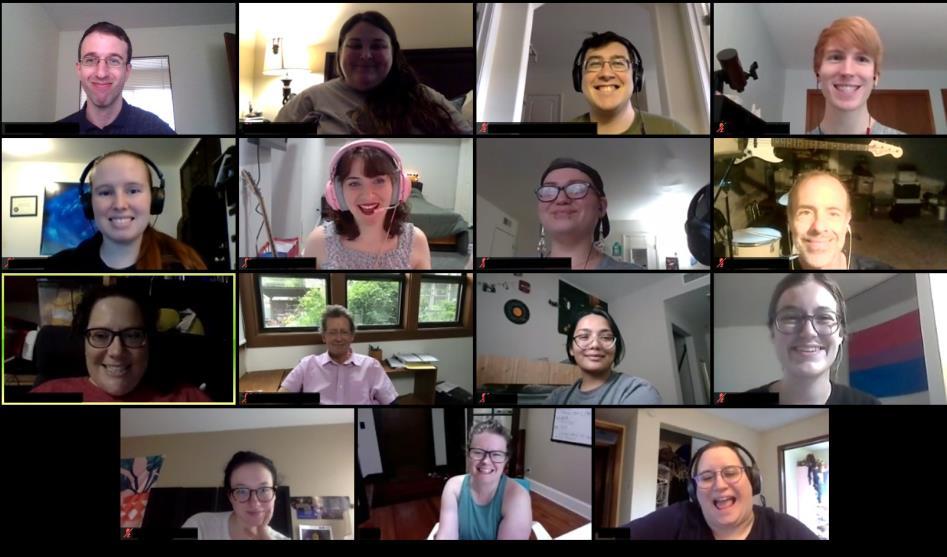

Physics &Astronomy Undergraduate Research
“I am a freshman researching on detecting Active Galactic Nuclei using methods of colorcolor diagrams. I thoroughly enjoy researching as it not only helps expand my knowledge of the subject, I'm majoring in but also exposes me to the professional life of an Astronomer. Given the experience I get out of being a Research Assistant, undergraduate research is worth it!”
-Disha Chakraborty, class of ‘26
In the KU Physics and Astronomy department, undergraduate students are exploring the universe through cutting-edge research.

2023
Jayhawk Research
Physics and Astronomy majors complete at least a semester of research as part of their degree requirements. Through research, students learn to apply advanced analytical techniques to pressing open questions about how the universe works from the tiniest scales to the largest. Our undergraduates perform research in the following sub-disciplines:
• Astronomy: With faculty leading research groups in observational astronomy (unique in Kansas to KU), the astrophysics group at KU is the largest in the state of Kansas. Students are using NASA’s James Webb Space Telescope to identify supermassive black holes in the early universe and explore the atmospheres of distant planets around other stars.
“My research was in particle physics. I studied new physics signals by running simulations of highly energetic particle collisions. The benefits of undergraduate research were multifaceted. For one, it introduced me to various technical skills that I now use in my graduate research. In a different light, research helped me develop other skills, such communication among colleagues and time management.”
-Morgan Cassidy, class of ‘23
• High Energy Physics: KU physicists are involved in multiple experiments at the Large Hadron Collider in order to understand the fundamentals of physics on the smallest scales imaginable. Undergraduates work on testing hardware to upgrade experiments at the LHC. On the theoretical side, machine learning algorithms, designed to explore complex and high dimensional data, are ideal tools to address most fundamental questions in particle physics. The computational aspect of particle physics is an excellent way of engaging undergraduate students with the cutting-edge research.
• Particle Astrophysics: As part of the effort to make the first measurements of ultrahigh energy neutrinos, KU has maintained an active research program with a track record of innovation over the last three decades. Students analyze data taken from detectors in Antarctica and Greenland to unravel the mystery of where these tiny cosmic particles originate from.
• Condensed Matter Physics: Students gain hands-on lab experience in vacuumbased microfabrication and non-vacuum based inkjet printing for electronic device fabrication. Characterization of the physical properties of these devices exposes students to material physics at sub-nanometer. The Computational Condensed Matter and Materials Physics group uses first-principles techniques to predict the properties of a wide variety of materials, in particular wide-bandgap oxides and electrodes for next-generation (non-Li) batteries. Undergraduate projects focus on the dynamics of novel cathode materials.

Jenny Zhang (class of ’22) and Kate Weineke (class of ’24) use the W. M. Keck Observatory. In Prof. Crossfield's KU ExoLab, undergraduate researchers play an integral part exploring strange, new worlds orbiting other stars. ExoLab student researchers have gone on to nationally competitive research internships, PhD programs at top astronomy graduate programs, and jobs in aerospace industry.
Summer Research
Jayhawk Undergraduate Summer Training (JUST)
Summer is prime time for students to engage in research without the demands on their time created by challenging coursework. Since 2020, Dr. Kirkpatrick and Dr. Peelaers have led a 10-week summer program for undergraduates, JUST. Students learn advanced computational techniques through workshops, attend research talks by faculty, and participate in a weekly journal club to read recent scientific papers.
The summer culminates in an Undergraduate Symposium, where students present talks on their research project and results.
“My first research project began with the creation of multi-color images of galaxies. This introductory project helped me to better understand my future astronomy courses and aided in the development and application of my analytical thinking skills. Now I look forward to applying the knowledge I learned in class to my future projects.”
-Christian Argueta, class of ‘26

The first JUST Symposium occurred virtually during 2020. Research kept going even though labs were shut down!
NSF REU Site
In 2022, Dr. Kirkpatrick and Dr. Peelaers won an ambitious grant from the National Science Foundation to create a Research Experience for Undergraduates (REU) program. Through the REU, our department now brings in 10 undergraduates from around the nation to participate in our summer research program each year. In addition to our research program, students go on social outings to explore our great state. This year, we had over 150 applicants!

Jayhawks Researching Around the Globe
REU and Internship Participation
Many of our Jayhawk undergraduates leave the nest during the summer and participate in REUs around the country. REUs are highly competitive, and the number of Jayhawks that get accepted is a testament to the strength of our undergraduate program. Here are some of the recent places our students have worked over the summer:
• Claire Cook (class of ’23), Green Bank Telescope, WV and the Netherlands Institute for Radio Astronomy
• Anika Goel (class of ’22), Space Telescope Science Institute, Maryland
• Joseph Hand (class of ’25), SETI Institute at UC Berkeley
• Kaz Gary (class of ’22), University of Florida
“My research experience with Dr. Lewis and Dr. Kong significantly strengthens my coding ability, especially in solving computationallyexpensive problems. Furthermore, doing research within a group helps me develop better communication and collaboration skills through weekly group meetings when I present my up-to-date results. Meanwhile, I learn to be more independent in problem solving. Overall, undergraduate research provides me an opportunity to do professional research, get a sense of gradschool life, and find my research interests, which benefit me still today ”
-Jenny Zhang, class of ‘22
• Del Endecott (class of ’25), Northern Arizona University
• Dmitri Schmitz (class of ’24), Rapid City, South Dakota
• Morgan Cassidy (class of ’23), University of Washington

Conferences

Our students have the opportunity to present their research at national conferences, particularly the winter meeting of the American Astronomical Society and the spring meeting of the American Physical Society. These conferences not only give our students the chance to network and advertise their work, they also raise KU’s national reputation as a leading undergraduate research institution
Consider Giving
Beginning this summer, we aim to provide two $5000 fellowships to Jayhawk Physics & Astronomy majors to participate in JUST. These fellowships will enable undergraduates to fully participate in our 10-week research program without also needing to juggle a job. This will allow for a fully immersive research experience. We need your help to make this dream a reality. If you are interested in donating to support student research, please visit https://www.launchku.org/JUSTresearch
Meet the Directors
Dr. Allison Kirkpatrick studies the biggest black holes in the universe using NASA space telescopes.
“Watching undergraduates grasp difficult concepts for the first time is the most rewarding part of my job. I enjoy working with undergraduates, remembering how far I’ve come, and knowing that they may one day be where I am now. Undergraduate research played a huge role in helping me decide to be an astronomer. I love giving that same opportunity to other students. I take a lot of pride and joy in watching their careers develop.”
Dr. Hartwin Peelaers is pioneering the next generation of batteries and nano-scale devices.
“It is amazing to see how in a relatively short time period undergraduate students evolve from not knowing much about solid state physics and coding in python, to being able to contribute to real current-day scientific research. I like seeing how students start to own their projects and become confident in their research abilities. Along the way, they have also learned lots of valuable skills that will aid them with whatever career path they choose to pursue.”
